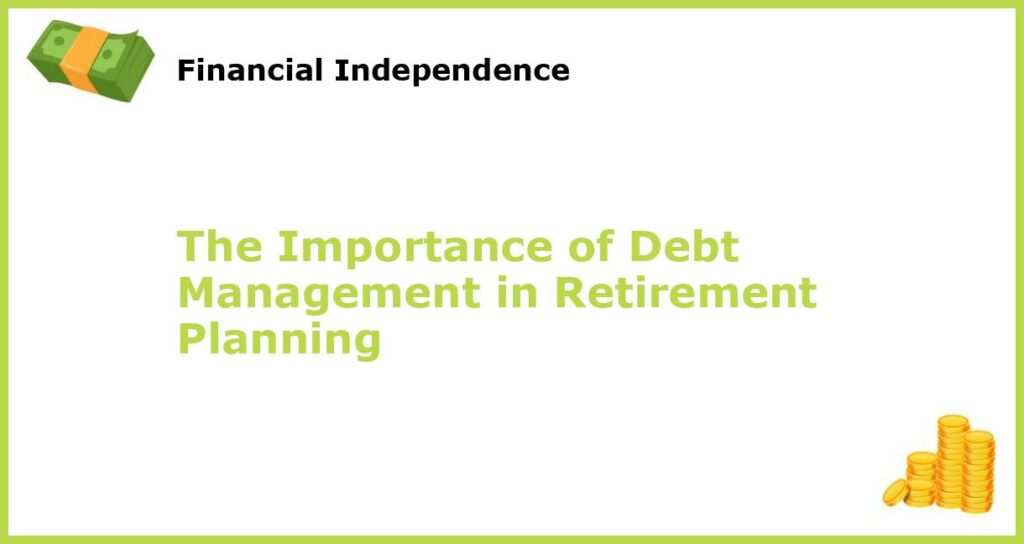Retirement planning can be a daunting task, and it involves taking many factors into consideration, including debt management. Debt management is a crucial aspect of retirement planning that is often overlooked, with many individuals assuming that their debt will disappear once they retire. Unfortunately, this is a situation that is not always the case. Therefore, having a solid debt management plan in place before retiring is essential for financial stability and preparedness for any unexpected expenses.
Why Debt Management is Important in Retirement Planning

Debt management is vital in retirement planning for several reasons. First, carrying debt into retirement can significantly impact one’s financial wellbeing. Debt payments can eat into the funds set aside for retirement income, leaving an individual with less money to cover essential expenses such as housing, healthcare, and food. It can also put one at risk of running out of money later in life, which can be incredibly challenging to deal with.
The second reason why debt management is crucial in retirement planning is that it enables individuals to prioritize their financial goals while paying off outstanding debts. Developing a financial plan that takes into account all outstanding debts, retirement income, and expenses can help people create realistic budgets and pay off debts faster while reducing the impact of debt on their retirement.
The Impact of Debt on Retirement

As mentioned earlier, carrying debt into retirement can seriously impact one’s financial wellbeing, particularly with debt payments that eat into retirement income, leaving less money for necessary expenses, such as housing, healthcare, and food. Additionally, carrying debt into retirement can put one at risk of running out of money later in life.
Moreover, when an individual retires with debt, the interest payments can accumulate and increase the total amount of debt owed. As such, individuals must develop a debt management plan before retiring, which should prioritize reducing and eliminating outstanding debts.
Developing a Debt Management Plan

Developing a debt management plan is essential to achieving financial stability in retirement. This involves carefully assessing all outstanding debts, including credit card balances, car loans, student loans, home loans, and any other debts, and prioritizing the most expensive debts with the highest interest rates. This can guide individuals to pay off these debts first and develop a realistic budget that allows them to pay off remaining debts faster.
While developing a debt management plan, individuals should also take into account their retirement income and expenses. This will enable them to come up with a plan that works best for their unique financial situation and prioritize their financial goals while reducing the impact of debt on their retirement.
Reducing Debt Before Retirement

One way to achieve financial stability in retirement while managing debt is to reduce the total amount of debt owed before retiring. While this may not always be possible, dedicating more money to debt repayment or consolidating debts to a more manageable payment plan can be helpful. Individuals can also cut back on spending, downsize their homes, and utilize other cost-cutting measures to help reduce debt.
By reducing debts before retirement, individuals can have more financial freedom and can be better prepared for unexpected expenses or emergencies while in retirement.
Managing Debt During Retirement

For individuals who carry debt into retirement, effectively managing their debt is vital. This may involve reducing expenses, generating additional income, or seeking professional financial advice. Staying on top of debt payments is equally essential as it can help minimize the impact of debt on retirement income.
The Role of Credit Scores in Retirement

One’s credit score plays a critical role in retirement as it can impact their ability to secure loans or credit during retirement. A poor credit score can make it harder to get good interest rates on credit and loans, while a good credit score can result in better interest rates and lower borrowing costs.
Therefore, working to maintain a good credit score is essential for individuals as it can improve their financial wellbeing during retirement and beyond.
Strategies for Improving Credit Scores

If an individual needs to improve their credit scores, several strategies can be employed. One of these is paying bills on time, which is a crucial factor in determining one’s credit score. Reducing debts and disputing any errors on one’s credit report can also help improve the credit score.
By taking the necessary steps to improve one’s credit score, individuals can set themselves up to enjoy a more secure financial future.
The Benefits of Seeking Professional Advice
Retirement planning and debt management can be overwhelming tasks, and seeking professional financial advice can be helpful. A financial advisor can provide guidance on debt management, retirement planning, and other aspects of personal finance, helping individuals make informed decisions about their financial future.
Ensuring Financial Stability in Retirement
Debt management is an essential component of ensuring financial stability in retirement. By developing a debt management plan that prioritizes debt repayment, reducing debt before retiring while working to improve your credit score and seeking professional advice, individuals can achieve financial freedom in retirement and enjoy a more secure financial future.
The Bottom Line
Debt management is an often-overlooked but critical aspect of retirement planning. Prioritizing debt repayment, reducing debt before retirement, and seeking professional advice can minimize the impact of debt on retirement income and enable individuals to enjoy financial freedom in retirement.







